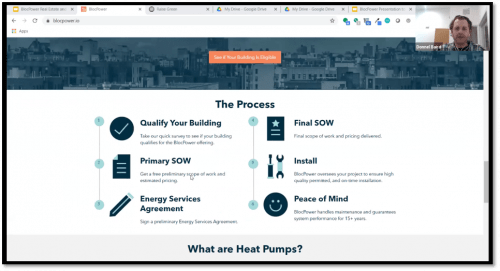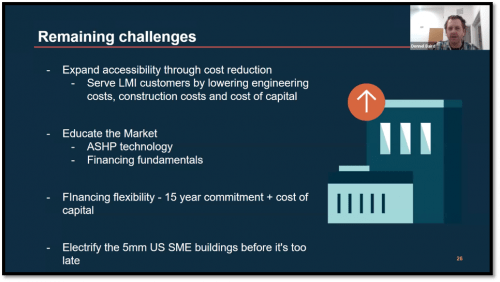Recently, Cornell’s real estate graduate students got a front-row seat to learn about increasing building energy efficiency, sustainability, and creating and growing a company from the ground up. BlocPower is a Brooklyn-based energy technology startup rapidly greening American cities. Since its founding in 2014, the company has completed energy retrofits in nearly 1,000 buildings. Their focus is on the small and medium multifamily and commercial buildings within the national built environment. Using proprietary software for analysis, leasing, project management, and monitoring of urban clean energy projects, BlocPower’s efforts are saving customers between 20% and 70% on energy costs annually. Sharing BlocPower’s story was the company’s Head of Finance, Cullen Kasunic. Mr. Kasunic previously co-founded United Wind in 2013, and has worked as a consultant guiding energy companies in the development of their project financing programs, yielding over $90 million of project finance capital for clean energy startups in New York.
BlocPower focuses on urban and suburban areas, serving dormitories, multifamily housing, hotels, houses of worship, and other types of properties. Their core purpose is moving beyond the addition of solar panels on the roof to provide insight into existing building conditions and the needs to truly address efficiency and sustainability. Their proprietary program is designed to serve property owners who cannot afford a $50,000 or $100,000 energy audit completed by an engineer. On a national level, buildings across the country are inefficient, unhealthy, or require upgrades.
The wider sustainability and public health crises are vital to centering BlocPower’s mission. Cleaning indoor air quality and increasing electrification has a profound impact on both public health issues, such as asthma attacks, and climate change. The opportunity to create meaningful change is highest when considering the national portfolio of existing real estate, as opposed to just newly built sustainable projects. In particular, ‘mom and pop’ ownership may not have access to capital or resources the way larger portfolios typically do. As generational ownership shifts, BlocPower has found that interest in increasing both building efficiency and sustainability is growing substantially.
Mr. Kasunic spoke about specific technology innovations and opportunities, including air source heat pumps, which offer both owners and tenants a better utility experience. In addition, he provided an overview of BlocPower’s new financing offering, which increases their ability to further their mission of facilitating energy conversion and efficiency for small- and medium-sized buildings. This is in conjunction with project incentivization and subsidies from state and municipal entities, non-profits, as well as BlocPower’s own capital.
BlocPower’s system was created using data from thousands of buildings the team gathered as part of a Department of Energy grant program, which they continue to update with publicly available information from additional cities as they enter new markets. This data allows them to generate what are essentially building models to offer initial estimates of savings and costs to prospective customers. The accuracy of this initial estimate is improved as more data is gathered and BlocPower gains additional experience, with the ultimate goal of generating pinpointed quotes without additional legwork.
BlocPower is a relatively new player in the field, hoping to help drive the electrification of existing real estate properties and infrastructure while much of the industry focus is on sustainability in new design and construction. As they have grown, they have been able to expand their market focus, refine their platform, and develop new tools such as their financing arm to better address some of the challenges they’ve encountered in implementing and promoting energy retrofits. We look forward to seeing how the company continues to grow amidst the groundswell of interest in sustainability and resilience initiatives sweeping the real estate industry.



